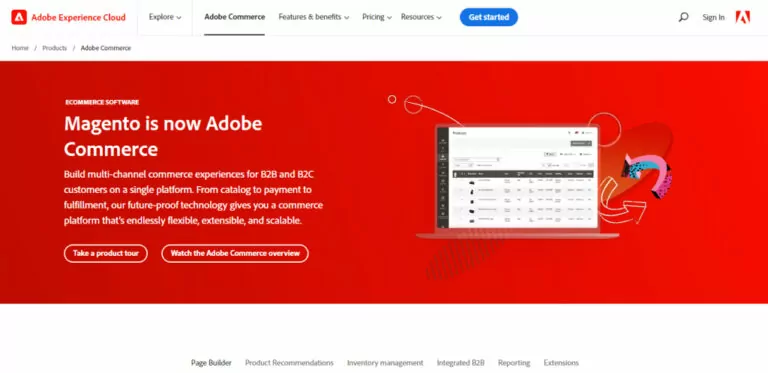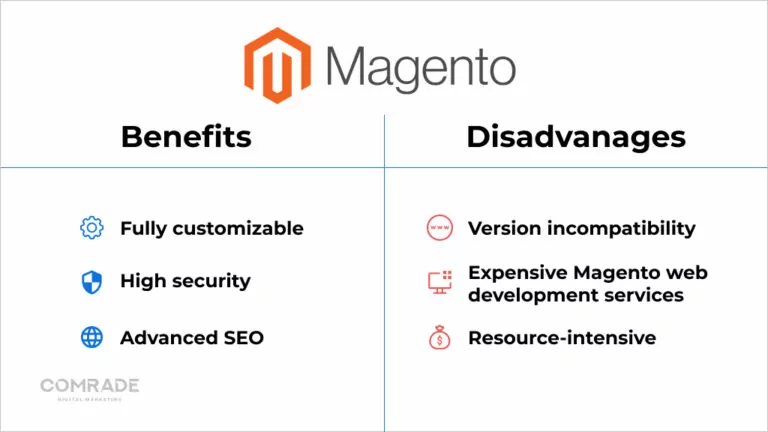What Is Magento?

Magento is an open-source eCommerce platform used by over 25% of online businesses to sell goods and services. Household brands like Coca-Cola, Samsung, and Ford rely on its marketing, search engine optimization, catalog-management tools, and countless other extensions to run their aspirational businesses.
One of the main characteristics that set the Magento platform apart from other eCommerce solutions is its extensive product management. Impressively, it can maintain over a million products, hence why it’s the favored platform among large enterprises, yet it also benefits smaller businesses who wish to scale with ease.
Being an open-source platform, it offers unrivaled flexibility to manage content, looks, and functionality. Unlike other eCommerce platforms, Magento provides a wide range of features, including grouping of products, SEO functionality, email segmentation, multi-store facility, private sales—the list of innumerable benefits goes on!
The flexibility and freedom of this leading eCommerce platform allow you to fulfill your most complex business needs. From Magento website development to online store promotion, there’s virtually nothing you can’t do with this winning eCommerce solution.
Why Your Business Should Choose Magento
Magento is second to none. Its open-source capabilities, incredible community support, and impressive scalability leave little doubt as to why this platform is trusted by enterprise titans. From a single panel, you can run multiple stores in multiple languages and currencies, while viewing analytics on daily purchases.
Within seconds, you can assess how your website is performing, and optimize its performance based on real-time feedback. Magento 2 supports industry standard SEO practices that help attract the right customers, while its compatibility with most payment gateways makes for a frictionless buying experience via an omnichannel retail portal.
The platform’s out-of-the-box features, extensions, and themes offer solid speed across devices. Essentially, it’s built for three things—performance, security, and extensibility. Magento’s deep Application Programming Interface (API) system makes it much simpler to “communicate” with external sales markets without needing too much-customized code.
Thus, in addition to providing its own sales funnel, Magento 2 also acts as inventory control for external stores like Amazon. Some businesses use an enterprise resource planning (ERP) system to manage products, categories, and prices. Magento is just simply that great!
Lastly, Magento 2’s integration with other advanced software applications allows merchants to sell, market, and advertise thousands of products, while simultaneously gathering data on marketing campaigns and customers to further optimize their business offerings and marketing efforts.
The Benefits of Using Magento 2

Magento 2 is the platform’s latest reincarnation. It takes what Magento 1 offers to a whole new level making it the most user-friendly and scalable eCommerce platform yet.
Fully Customizable
Businesses can customize, modify and optimize their stores to meet their requirements and proactively adjust management activities to serve their needs. Its improved checkout process and mobile-friendly nature mean it’s easier for customers to access your products and buy from your store across devices.
High Security
From Google reCAPTCHA login screens to secondary password prompts and PCI Data Security standards, Magento 2 bolsters businesses against unwanted security breaches and site attacks. Must-have security components such as SSL certificates are also easy to acquire with an upgrade to Magento 2.
Advanced SEO
Using Magento 2 allows eCommerce stores to create URLs, meta descriptions, tags, and product descriptions that align with specific keywords to rank higher on SERPs. Moreover, its introduction of rich snippets lets you define make-up data on product pages to increase product page click-through rates.
The Disadvantages of Magento 2
Magento 2 has a complex architecture that demands time and expertise if you truly want to leverage its benefits.
Version Incompatibility
Moving from Magento 1 to Magento 2 is a complex migration that requires a full re-platform. Many aspects of your original store, including the developer and design work, and theme, will need, to be recreated entirely. Magento no longer creates updates or security patches for Magento 1; thus, you have no choice but to migrate, which costs time and money.
Expensive Magento Web Development Services
It’s not really possible to build a customized Magento eCommerce website without hiring a professional developer who understands how PHP frameworks work. However, an experienced Magento developer will take your store to the next level because they know what has to be done to accelerate your website’s performance and achieve your KPIs.
Resource-Intensive
Magento 2 is self-hosted and resource-intensive, requiring heavy-duty servers to ensure your eCommerce store runs well. You’ll need a large private or dedicated server to keep up with its required disk space. While worthwhile, this investment comes with additional responsibilities and costs.
Which Types of Business Are Best for Magento?
Currently, Magento is used by major businesses in different industries across the B2B and B2C space, due to its extensive range of features, robust support system, and flexible degree of customization.
It offers three options to build your eCommerce store—Magento Open Source (free) and Magento Commerce (paid), and Magento Cloud (paid). All versions have the same core features, but merchants prefer the paid versions as they better match the operational capacities required of large commercial enterprises.
Why? Well, technically, Magento can cater to any store. What makes it stand out is that it grows and evolves with your business. Most of the time, merchants migrate to a new platform as their store evolves. With Magento, you can stay in one place.
If you’re a B2B or B2C business wanting to build a big eCommerce business with international potential or simply cater to national or local markets, we recommend hiring our Magento web development services to help launch your digital operation.
Magento is unquestionably a business-orientated eCommerce platform designed for creating large-scale and complex eCommerce projects. Its cutting-edge capabilities, customization, and top-notch performance make it the best choice for businesses with big ambitions.


















